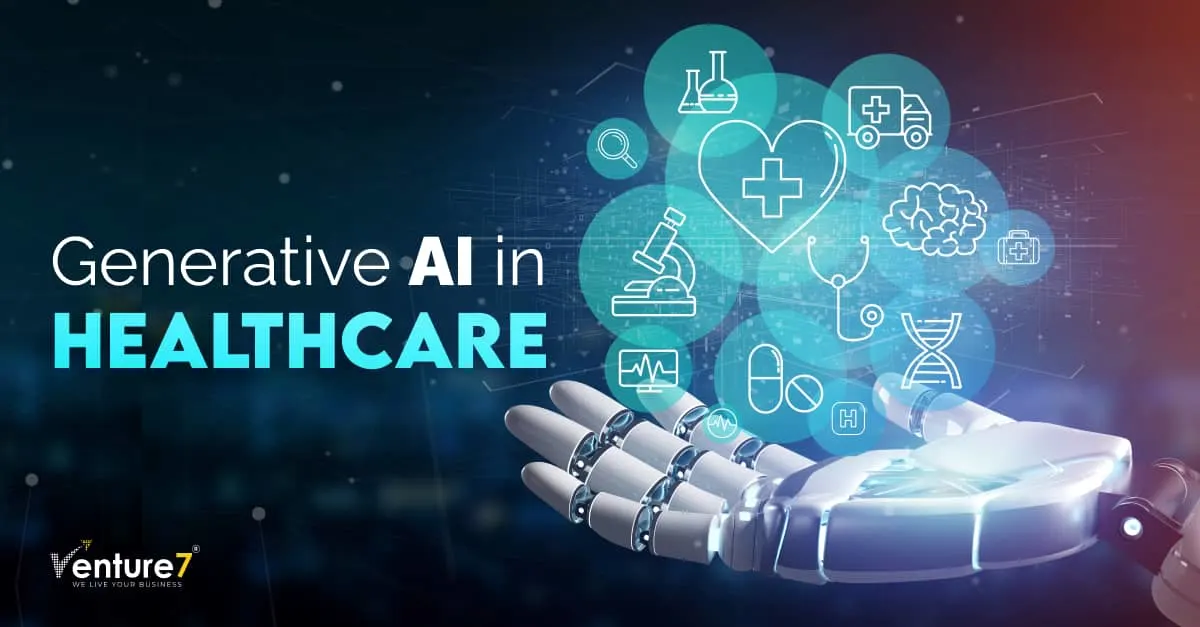The healthcare landscape is entering a groundbreaking phase driven by the emergence of artificial intelligence (AI). While traditional AI is known for its significant role in analyzing existing data, Generative AI moves ahead by creating new data or content. This innovative technology also has amazing potential to transform healthcare in multiple ways. The role of Generative AI in healthcare starts from streamlining administrative tasks to enhance drug discovery and further personalize patient care.
Why Generative AI
It has been observed that healthcare professionals take a lot of time documenting patient data and clinical notes, which is of course critical and necessary for accurate diagnosis and treatment but at times this may lead to added burdens on the administration and result in incomplete documentation. To deal with this, AI came to the rescue, and talking about the purpose of Generative AI in Healthcare, it does much more than AI. It uses algorithms trained on vast datasets to understand patterns and relationships. It further allows the AI to not only analyze information but also create new and realistic data points, text formats, or images. For example, it can generate realistic medical images for training purposes, write detailed medical reports based on patient data, or even design new molecules with other therapeutic applications.
Contribution of Gen AI in Healthcare Delivery
When it comes to transforming healthcare delivery, here’s a glimpse into how generative AI is contributing to healthcare:
- Enhanced Efficiency: Generative AI can easily automate an entire array of administrative tasks like never before. It includes simple tasks like appointment scheduling, claims processing, and report generation, which results in saving a lot of your time. It helps in freeing up valuable time for healthcare professionals so that they can focus more on patient care.
- Revolutionizing Diagnostics: It becomes easy to detect abnormalities in medical images with more accuracy and efficiency with the use of AI-powered analysis and with the use of Generative AI, they can be further enhanced for creating synthetic medical images to train/educate diagnostic algorithms on a broad range of scenarios.
- Personalized Medicine: Generative AI can also easily analyze a patient’s unique genetic makeup and medical history. The use of Generative AI in Healthcare is observed in creating personalized treatment plans as well as in predicting potential risks.
- Drug Discovery: Till now, it has been observed that the traditional drug discovery process is lengthy as well as expensive. But now, with the introduction of Generative AI, new drug molecules can also be designed with particular properties, saving the time and resources required to bring new treatments to market.
- Patient Engagement: Generative AI can also be used for creating intelligent chatbots or virtual assistants that can offer patients 24/7 access to information and can reply to basic questions with efficiency.
Challenges and Considerations
Therapists often find it difficult to spend a lot of time creating SOAP notes as therapy sessions may go on for extended hours, intensifying the documentation process. Applications of Generative AI in Healthcare are vast as it has the potential to shape Healthcare in a way that leads to transformation. While we can’t deny the great potential of Generative AI, still certain challenges need to be addressed:
Data Privacy: As evident, Generative AI mainly relies on huge amounts of patient data. So, maintaining data privacy and security, it needs robust ethical frameworks as well as regulations.
Model Bias: AI models are usually good only with the data they are trained on. Biased data can further lead to biased outputs, potentially intensifying existing health disparities.
Transparency: Generative AI needs to understand how it makes decisions to gain trust. This transparency helps in building trust among medical professionals.
Generative AI Healthcare Use Cases
- AI-powered microrobots swim through a patient’s bloodstream and aim to deliver targeted medication directly to diseased cells.
- Surgical robots are controlled by surgeons who are operating remotely, backed by real-time holographic overlays of your organs and tissues produced by quantum computing.
- Quantum-powered BCIs (Brain Computer Interfaces) could easily bridge the gap between our minds and machines to facilitate paralyzed patients with control of prosthetics with thought.
- Transform drug discovery by affecting complex molecular interactions as well as designing new drugs at amazing speeds.
- Secure transmission of medical data across huge distances assists in remote consultations with specialists, a great reality.
Other Potential Areas for Implementation
- Examination of a scanned report to extract useful medical information
- Generation of a summary of a patient’s medical background for the clinician’s use
- Tailored treatment plans by leveraging an individual’s medical history and conditions, for better results.
- Converting clinician-patient dialogues into clinical notes through transcription.
- Analyzing extensive medical datasets to identify trends and irregularities to enhance diagnostic and treatment efficacy.
The Road Ahead
Generative AI is still undergoing development. However, we cannot oversee its potential to enhance healthcare outcomes and transform patient care.
It has countless benefits apart from enhancing the future of medicine. According to a survey conducted by Deloitte Center for Health Solutions, 75% of top healthcare firms are already trying or planning to expand Generative AI. Besides, 82% are setting up rules for Generative AI, and leaders also believe that it can boost efficiency by 92% and speed up decisions by 65%.
As this technology matures, it’s anticipated that even more healthcare providers will recognize its value, leading to broader implementation and more innovative applications suggesting a future where healthcare generative AI becomes integral to delivering personalized, efficient, and advanced healthcare services.
Conclusion
The future of healthcare is enveloped with a whole lot of possibilities ahead and the credit of which goes to generative AI. AI isn’t just a trending word; it’s going to be a game-changer for healthcare.
It encourages a streamlined approach that significantly reduces the time and efforts required for documentation, facilitating healthcare professionals to focus on delivering top-tier patient care. By harnessing the power of this technology ethically, we can not only enhance access to care but also improve outcomes to create a healthcare ecosystem, which is personalized, efficient, and effective for all.





